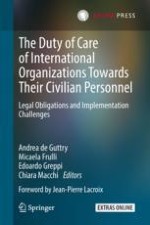2018 | OriginalPaper | Chapter
2. Comparative Analysis of International Jurisprudence and Relevant International Practice Related to the Duty of Care Obligations Incumbent on International Organizations Towards Their Mobile Workforce
Author : Andrea de Guttry
Published in: The Duty of Care of International Organizations Towards Their Civilian Personnel
Publisher: T.M.C. Asser Press
Activate our intelligent search to find suitable subject content or patents.
Select sections of text to find matching patents with Artificial Intelligence. powered by
Select sections of text to find additional relevant content using AI-assisted search. powered by
